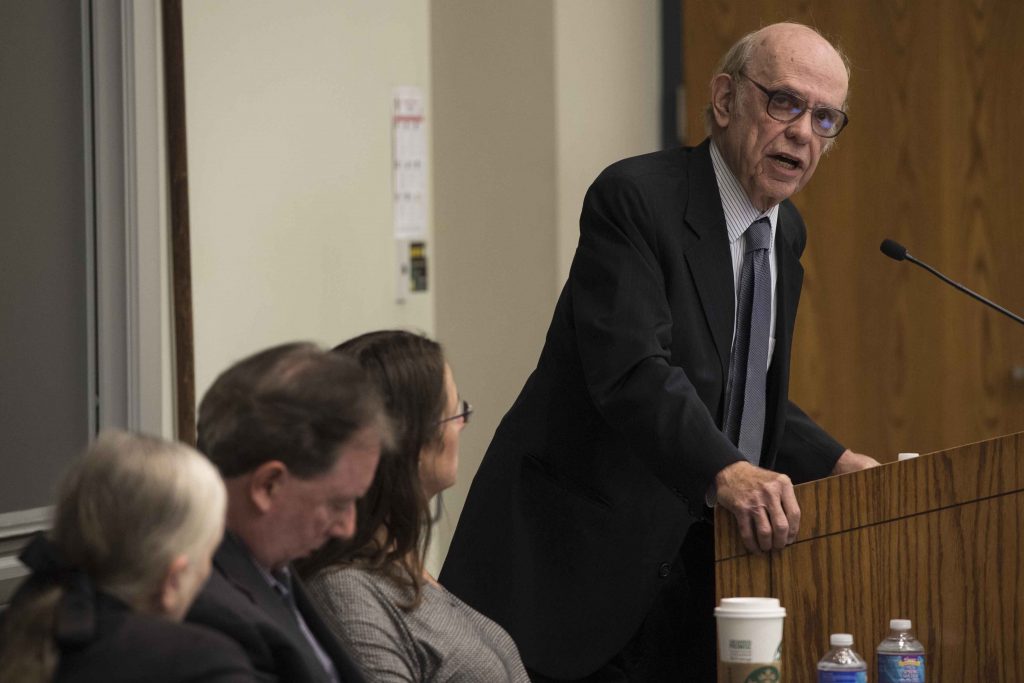Searching for a legal and philosophical foundation from which to take stock of eight months’ worth of controversial and largely unprecedented moves by the Trump administration, four Boston College scholars gathered on the Law School campus September 13 to discuss the Constitution, the administration’s relationship to it, and the role it might play in upcoming judicial and political battles.
In a conversation that ranged from the legal particularities of current lawsuits to expansive commentary on national politics, the speakers highlighted, from their different disciplinary perspectives, an unfolding political drama still in its early acts. BC Law Dean Vincent Rougeau moderated the Constitution Day event cosponsored by the Law School and the Clough Center for Study of Constitutional Democracy.
Boston College law professors George Brown and Daniel Kanstroom surveyed the legal issues involved in attempts to use the Constitution to address what Brown called “Trump’s disturbing attitude toward the law.” Both highlighted the complexities involved in taking legal action against the administration.
Brown suggested that the “legal standing” in Citizens for Responsibility and Ethics in Washington v. Trump, which concerns emoluments, “is dubious,” and that a better approach might be broader political action rooted in legal interpretation. “I believe it is perfectly possible,” he argued, “to read the foreign emoluments clause as a grant of power to Congress,” who could “pass a statute outlawing the things that President Trump is doing.”
For Kanstroom, President Trump’s controversial decision to pardon Maricopa County Sheriff Joe Arpaio might raise “a potentially dangerous constitutional imbalance” since the pardon seems to undermine the judicial branch’s power to check the executive. Of course, the “million-dollar question,” he suggests, is if federal judges will take up the issue or ignore the pardon and its potentially significant implications.
Boston College political science professor Kay Schlozman and history professor Heather Richardson offered more broadly political perspectives on Trump. Emphasizing the “institutional” aspects of his approach to governing, Schlozman pointed out that Trump is the first president since Eisenhower not to have held significant elected office before assuming the presidency, and his business experience—during which he has never had to answer to a board of directors or company shareholders—demonstrates that he “has had very limited experience with accountability.” Instead, he seems to have what Schlozman called “a television conception of the presidency,” and thus does not understand “the constitutional, legal, institutional, and political constraints on presidential power.”
Taking an even wider view, Richardson warned, “We are at an enormous crisis in this country because power does not reflect the will of the majority,” citing such Republican efforts as gerrymandering and voter suppression, which have created serious electoral imbalances. When such imbalances have occurred in the past, approaches to government, she argued, “go back to the ground,” forcing us to acknowledge that “many American voters believe that the Constitution is on the table again”—a point that Kanstroom echoed when he remarked that “there is a yearning” at the present moment “for a coherent theory of government in tune with our historical political ideals.”
Of course, the problem that this “yearning” raises is who gets to say what those ideals are and how we are to interpret them—a problem that leads right back to the Constitution. As the speakers’ comments suggested, interpretations will continue to be voiced as this political drama evolves.
Photograph: Panelists BC Law Professor George Brown at lectern with, from left, Kay Schlozman (BC Political Science), Daniel Kanstroom (BC Law), and Heather Richardson (BC History).


